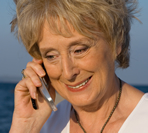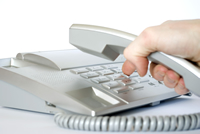Long-Distance Caregiving

 A long-distance caregiver lives far away from the stroke survivor. This person may or may not be the primary caregiver.
A long-distance caregiver lives far away from the stroke survivor. This person may or may not be the primary caregiver.
What Are the Special Challenges for the Long-Distance Caregiver?
Living far away presents extra challenges in caregiving. Traveling to your loved one can be costly. It may be hard to take time off of work.
If you are not the primary caregiver, you face other challenges. Working with another caregiver involves good communication and understanding. You may not always see eye-to-eye. Remember that you both are trying to provide the best care. Listen to each other and be supportive.
What Are the First Things You Should Do as a Long-Distance Caregiver?
- Plan a visit to your loved one to assess the situation.
- Talk to your loved one about what he or she needs.
- Work closely with the local caregiver, if there is one. The local caregiver is the best judge of what is needed.
What Questions Should You Ask to Plan Your Loved One’s Care?
- What can my loved one (and the local caregiver) do without help from others?
- What specific help does my loved one need and want?
- How will services be paid for?
- How can I help?
How Can You Find Services in the Local Area? 
Use the telephone and Internet to find local services – It can be difficult to find services when you are not familiar with the local area.
Contact the social worker at the local VA medical center – The VA provides short and long-term home care services. The VA may pay for some services.
Contact the local Area Agency on Aging – They can assess your loved one’s needs and eligibility for services. They can help you find local services. These include housekeeping, personal care and other services.
Use a phone book from your loved one’s area – You can find one on-line. The Blue Pages list state and local services. The Resources section has contact information for The Blue Pages.
Find help in your community – Check with the local church, Veterans’ association or community groups for support.
Talk to a geriatric care manager or care coordinator – This is a specialist in planning care for older people. The local Area Agency on Aging can help you find one. The National Association of Professional Geriatric Care Managers can also help. The Resources section has contact information for finding your local Area Agency on Aging. It also has information for the National Association of Professional Geriatric Care Managers. Learn more about getting help from community services.
What Can You Do Living Far Away?
You can’t provide daily care. But, you can help in other ways.
- Arrange services and hire healthcare workers.
- Help with finances; you can pay bills on-line or through direct deposits or the mail service.
- Obtain information about insurance benefits.
- Learn all you can about your loved one’s medical problems and treatments.
- Show your love by telephoning and sending gifts and letters.
Why Is It Important to Talk with Your Loved One and Local Caregiver Often? 
Your loved one’s needs will change over time. Plan conference calls with your family, professionals and other workers. A geriatric care manager can also keep tabs on how things are going.
What Is the Family and Medical Leave Act?
You can take leave for some family reasons. Check with your employer. The Family and Medical Leave Act (FMLA) requires some employers to allow up to 12 weeks of unpaid leave. Some states have laws that expand leave. The Resources section has more information on the FMLA.
Helpful Tips
- It is normal to feel guilty that you are not doing enough – Remind yourself that you are doing the best you can.
- Coordinate care from a distance – Keep a list of friends, local people and agencies that can help.
Remember
- Work as a team with your loved one and local caregiver to plan care.
- You can do many things as a long-distance caregiver. You can pay bills, find information and offer support.
- Contact a VA social worker, a geriatric care manager or look on-line to find help.
More Resources 
Additional credible resources on this topic can be found here. Website pages may change or update, therefore if a link does not work, you may also try to type the information into your internet search bar. This Resource List will be updated frequently.
|
*Link Disclaimer: Links to information and Web sites outside of the Department of Veterans Affairs do not indicate an endorsement of products or services offered by the sites. In addition, these sites may have privacy and security policies that are inconsistent with those of VA. |
These materials were created for the project:
Web-Based Informational Materials for Caregivers of Veterans Post-Stroke
Project Number SDP 06-327 funded by VA HSR&D Quality Enhancement Research Initiative (QUERI)



















